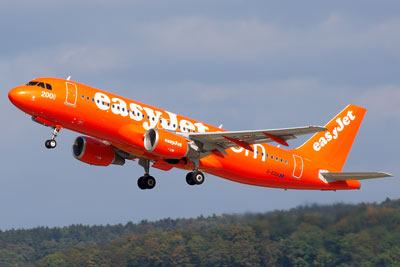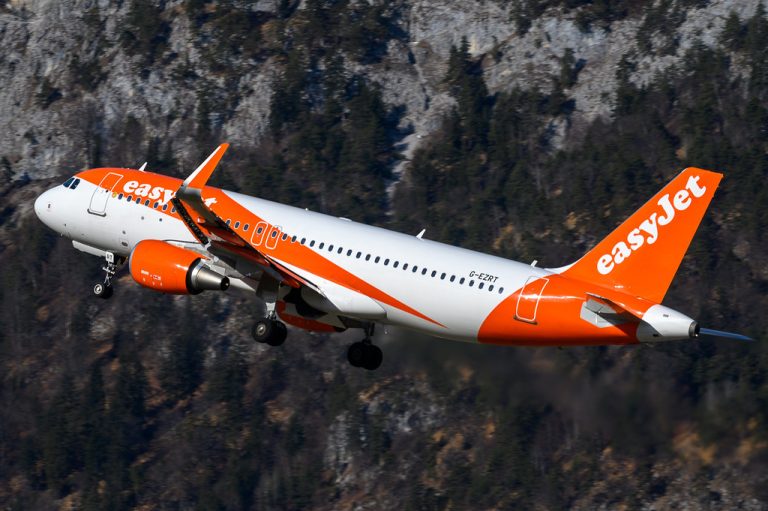easyJet plc (LON:EZJ) has announced its results for the twelve months ending 30 September 2024.
easyJet improves annual profits by 34%, achieving £610 million PBT, following another record summer
· Strong progress towards medium term targets
– FY24 headline profit before tax of £610 million, +£155 million YoY (Reported PBT £602 million)
– easyJet holidays recorded £190 million profit before tax, +56% YoY
– ROCE of 16% in FY24, +3ppts YoY, strong progress towards target of high-teen ROCE
– Group headline PBT per seat +24% YoY, achieving £6.08 per seat, a positive step towards our £7-10 target
· Record H2 headline profit before tax of £960m, +£94m YoY
– H2 Passenger growth +7% YoY
– H2 RPS +1% YoY, (Q4 RPS +1% in line with guidance)
o H2 RASK reduced 1% YoY
– Headline H2 CPS ex fuel increased 2% (in line with guidance) & H2 fuel CPS reduced 2% YoY
o H2 Headline CASK ex fuel increased 1% YoY, total CASK reduced 1% YoY
– Holidays H2 profit increased +42% YoY
· Positive outlook for FY25
– Expect FY25 capacity of c.103m seats, an increase of 3%
o ASK capacity growth of c.8% driven by average sector length increase of c.5%
– Expect to reduce winter losses with a significant improvement in Q1, with Q2 impacted by the timing of Easter.
o H1’25 ASK capacity +12% driven by average sector length growth of c.6%
o Q1’25 RASK expected to be broadly flat
o H1’25 headline CASK ex fuel expected to slightly reduce YoY
o H1’25 fuel CASK is expected to reduce by c.10%
– easyJet holidays customers planned to grow by c.25% in FY25, from a base of 2.6m customers
· Proposed dividend: 20% of FY24 headline PAT payable in early 2025
· Continued confidence in execution of >£1bn PBT in medium-term
Johan Lundgren, easyJet’s CEO, said:
“This strong performance – resulting in a 34% increase in our annual profits – reflects the effectiveness and execution of our strategy as well as continued popularity of our flights and holidays. It also represents a significant step towards our goal of sustainably generating over £1 billion annual profit before tax.
“It has been a privilege to lead easyJet for the past seven years. I am extremely proud of all that has been achieved, which is a result of the hard work of the entire team. I am pleased to be leaving a strong easyJet, the future for the company is bright and I look forward to seeing Kenton delivering his ambitious plans, generating positive shareholder returns while making low-cost travel easy for millions of customers.”
Kenton Jarvis, easyJet’s CFO and CEO designate, said:
“The outlook for easyJet is positive and travel remains a firm priority with consumers who value our low fares, unrivalled network and friendly service. The airline will continue to grow, particularly on popular longer leisure routes like North Africa and the Canaries and we plan to take 25% more customers away on package holidays, as easyJet holidays continues to thrive. I am looking forward to taking over the controls of this fantastic business in the new year and we still have a lot to go for as we progress towards our ambitious targets.”
Overview
The execution of our strategic initiatives has seen easyJet deliver strong earnings growth with headline profit before tax of £610 million, a 34% increase year-on-year. The airline reduced winter losses by £40 million through a combination of productivity and utilisation benefits. 16 new A320neo family aircraft were delivered in the year moving the average gauge from 179 to 181, driving cost efficiencies of c.£25 million. easyJet holidays achieved a PBT of £190 million driven by a growth in customer numbers of 36%. Overall this has resulted in achieving a ROCE of 16% in FY24, a strong improvement from the 13% in FY23. These results represent a positive momentum towards our target to sustainably generate over £1 billion profit before tax.
Shareholder returns
The Board is recommending an ordinary dividend of 12.1 pence per share (2023: 4.5 pence), amounting to £92 million (2023: £34 million) subject to shareholder approval at the upcoming Annual General Meeting. This will be paid on 21 March 2025 to those shareholders on the register at the close of business on 21 February 2025. This represents 20% of the headline profit after tax.
The Board is committed to maintaining regular returns to shareholders through this ordinary dividend. Future returns of excess capital will continue to be assessed, taking into account market conditions, capex requirements and progress towards the Group’s medium-term targets. The Board remains focussed on delivering attractive returns on capital employed for shareholders.
ESG
We are the best ESG rated European airline from Sustainalytics (score of 21.4) and MSCI (AA rating). We hold a best in class rating from CDP (A-) and we also retained our position in FTSE4Good for a second year running. The efficiencies which we have ahead of us will only strengthen this position.
Capacity
During Q4 easyJet flew 30.0 million seats, a 5% increase on the same period last year when easyJet flew 28.6 million seats. Load factor was 92% (Q4 FY23: 92%). Passenger numbers in the quarter increased to 27.7 million (Q4 FY23: 26.2 million).
Capacity for the full year increased by 8% to 100.4 million seats. In the year easyJet has flown 6.9 million more passengers than in FY23.
| July2024 | Aug 2024 | Sept2024 | Q4FY24 | Q4FY23 | FY24 | FY23 | |
| Number of flights | 55,915 | 56,265 | 54,807 | 166,987 | 160,445 | 558,960 | 519,426 |
| Peak operating aircraft | 333 | 333 | 333 | 333 | 319 | 333 | 319 |
| Passengers (thousand) | 9,380 | 9,457 | 8,842 | 27,679 | 26,188 | 89,684 | 82,754 |
| Seats flown (thousand) | 10,048 | 10,117 | 9,842 | 30,007 | 28,591 | 100,448 | 92,619 |
| Load factor | 93.4% | 93.5% | 89.8% | 92.2% | 91.6% | 89.3% | 89.3% |
| Q4’24 | Q4’23 | FY24 | FY23 | Changefavourable/(adverse) | ||
| Passenger revenue (£’m) | 2,068 | 1,970 | 5,715 | 5,221 | 9% | |
| Airline ancillary revenue (£’m) | 851 | 786 | 2,457 | 2,174 | 13% | |
| Holidays revenue1 (£’m) | 490 | 366 | 1,137 | 776 | 47% | |
| Group revenue (£’m) | 3,409 | 3,122 | 9,309 | 8,171 | 14% | |
| Fuel costs (£’m) | (684) | (675) | (2,223) | (2,033) | (9)% | |
| Airline headline EBITDA costs ex fuel (£’m) | (1,385) | (1,314) | (4,754) | (4,347) | (9)% | |
| Holidays EBITDA costs1 (£’m) | (411) | (306) | (965) | (661) | (46)% | |
| Group headline EBITDA costs (£’m) | (2,480) | (2,295) | (7,942) | (7,041) | (13)% | |
| Group headline EBITDA (£’m) | 929 | 827 | 1,367 | 1,130 | 21% | |
| Airline depreciation & amortisation (£’m) | (225) | (159) | (762) | (649) | (17)% | |
| Holidays depreciation & amortisation (£’m) | (2) | (2) | (8) | (5) | (60)% | |
| Group headline EBIT (£’m) | 702 | 666 | 597 | 476 | 25% | |
| Airline financing costs excluding balance sheet revaluations (£’m) | 8 | 2 | (15) | (59) | 75% | |
| Holidays financing costs (£’m) | 9 | 5 | 26 | 12 | 117% | |
| Airline balance sheet revaluations (£’m) | 5 | (10) | 2 | 26 | (92)% | |
| Group headline PBT (£’m) | 724 | 663 | 610 | 455 | 34% | |
| Airline passenger revenue per seat (£) | 68.91 | 68.90 | 56.90 | 56.37 | 1% | |
| Airline ancillary revenue per seat (£) | 28.38 | 27.51 | 24.45 | 23.47 | 4% | |
| Total airline revenue per seat (£) | 97.29 | 96.41 | 81.35 | 79.84 | 2% | |
| Total airline RASK (p) | 7.61 | 7.67 | 6.65 | 6.52 | 2% | |
| Airline headline cost per seat ex fuel (£) | (53.23) | (51.84) | (55.03) | (54.30) | (1)% | |
| Airline headline CASK ex fuel (p) | (4.16) | (4.12) | (4.50) | (4.44) | (1)% | |
| Airline fuel cost per seat (£) | (22.79) | (23.60) | (22.14) | (21.95) | (1)% | |
| Fuel CASK (p) | (1.78) | (1.88) | (1.81) | (1.79) | (1)% | |
| Airline headline total cost per seat (£) | (76.02) | (75.44) | (77.17) | (76.25) | (1)% | |
| Airline headline total CASK (p) | (5.95) | (6.00) | (6.31) | (6.23) | (1)% | |
| Available seat kilometres (ASK) (millions) | 38,355 | 35,960 | 122,885 | 113,334 | 8% | |
| Average sector length (km) | 1,278 | 1,258 | 1,223 | 1,224 | 0% | |
| Cash and money market deposits (£’bn) | 3.5 | 2.9 | 21% | |||
| Net cash (£’m) | 181 | 41 | 341% | |||
| ROCE | 16% | 13% | 3ppt | |||
| Headline earnings per share (p) | 61.3 | 45.4 | 35% |
Outlook
· Expect to reduce winter losses with a significant improvement in Q1, with Q2 impacted by the timing of Easter and a prior year release of aged balances.
· Bookings and RASK
– Q1’25 is 80% sold, +2ppts year on year and we expect RASK to be broadly flat year-on-year.
– Q2’25 is 26% sold, +2ppts year on year against headwinds from the timing of Easter (moving into Q3’25) and the prior year release of c.£34m aged balances (these two combined are worth c. 4ppts of RASK reduction YoY)
· H1’25 CASK
– Headline CASK ex fuel is expected to slightly reduce, due to productivity and utilisation benefits.
– Fuel CASK is expected to reduce by c. 10% in H1’25
· Capacity growth expected to be c.3% in FY25.
– FY25 ASK capacity growth expected to be c.8%
o Average sector length expected to increase by c.5%
– H1’25 is expected to have c.45 million seats, +6% year on year
o ASK capacity growth expected to be c.12%
o Average sector length will increase by c.6% as we continue to increase capacity into winter sun destinations such as North Africa and the Canary Islands
– H2’25 is expected to have c.58 million seats, +1% year-on-year
o ASK capacity growth expected to be c.5%
o An increase in average sector length of c. 5% is expected
· easyJet holidays customers planned to grow by c.25% in FY25, from a base of 2.6m customers
– H1’25 is 82% sold
Fuel & FX Hedging
| Jet Fuel | H1’25 | H2’25 | H1’26 | USD | H1’25 | H2’25 | H1’26 | |
| Hedged position | 80% | 59% | 24% | Hedged position | 75% | 53% | 26% | |
| Average hedged rate ($/MT) | 808 | 771 | 761 | Average hedged rate (USD/GBP) | 1.26 | 1.28 | 1.29 | |
| Current spot ($/MT) at 25.11.24 | c.740 | Current spot (USD/GBP) at 25.11.24 | 1.26 | |||||
– Carbon obligation including free allowances
o 100% covered for CY24 at €48/MT
o 96% covered for CY25 at €43/MT
– USD Lease payments hedged for the next three years at 1.26
– Capex hedged for the next 12 months in EUR & USD








































